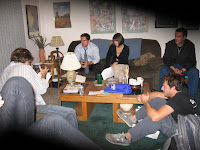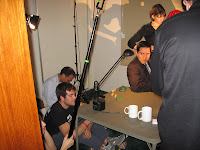I just got back from a week’s vacation in Hawaii. During that time I didn’t read a single newspaper, in print or on line. When I returned, seven days of the LA Times were delivered at once. And I find that some disturbing things occurred in my absence.
Barry Bonds was indicted, Ira Levin (author of "Rosemary’s Baby") died, the stock market went down and then up again. The housing market stayed down.
Maybe the most disturbing news was the suicide by hanging of Lisa McCalmont, a 49 year old lawyer from Oklahoma who was actively involved in challenging the constitutionality of lethal injection as a means of capital punishment. She had worked for the federal public defender and had won reversal of at least one other death verdict on appeal, resulting in a life sentence. She lectured across the country to defense lawyers on the subject and was lead counsel on cases that forced Oklahoma to suspend its lethal injection procedures.
According to the Times Obit, she left no note, and friends were unable to explain why she killed herself. I showed the article to Greg, thinking it "ironic." He said it wasn’t irony, but I don’t know.
I can’t help wondering why she chose hanging, a particularly painful form of execution, which had been rejected as "cruel" in favor of more humane forms, like lethal injection, which she crusaded against.
Was she sending a message?
Tuesday, November 20, 2007
Sunday, November 04, 2007
Lights, Camera ,,, Your Witness

 I spent the weekend watching aspiring film makers do their thing. There were some actors, a camera operator, a few others who helped with the sound, production, props, and the all-important food breaks.
I spent the weekend watching aspiring film makers do their thing. There were some actors, a camera operator, a few others who helped with the sound, production, props, and the all-important food breaks. I was particularly interested in the young guy who was directing the piece. While the others were responsible for their particular roles, each came to him to make the final choices about all the details that seemed to be critical to the success of the project. Though there were suggestions and alternatives offered from all sides, his was the final word each time. Even for a one day "shoot" of an 8 page script on a mini budget, he had to make decisions about almost every aspect of the work. I couldn’t help comparing his job to mine.
Every case, especially those that come to a trial, involves hundreds of similar decisions. A "story" has to be told, usually a mystery. Sometimes a whodunnit, or why, or how, but always some riddle that has to be decided. On occasion, the trial becomes a thriller or a comedy and almost all criminal cases have elements of tragedy.
The lawyer is performing, orchestrating by his questions, his arguments — molding a "script" for his audience. Where should the emphasis be placed? How should the scenes be set? It is a performance that demands a certain amount of "craft."
But there are certainly differences.
But there are certainly differences.
For one, the director of the film can shoot his scenes in alternative versions and then edit at leisure to tailor his story. The performance of the trial is more akin to a "live" show. The lawyer has to edit on the fly, if at all, by trying to keep out "bad" evidence, to prevent blurted deviations from his theme.
Rarely, the lawyer gets a "do over" when there is a mistrial, a hung jury. Then the drama has to be played out again, with the handy "script" that we call a "transcript," the record of the previous testimony. With the surprise now gone, these shows tend to be anti-climactic and dull, at least for the lawyers. That is, until one of the lawyers decides to "edit" by presenting different or additional witnesses.
Or, as sometimes happens, a witness decides to be creative by improvising new answers to the questions previously asked. That gets to be fun.
The lawyer has one advantage over the film director. He has only to please an audience of 12. But he picks them from among a large pool of unwilling applicants. The director is at the mercy of a random audience which he cannot choose, except by advertising his production in order to entice a favorable pool.
As I watched the director coaching his actors to produce the greatest impact for each scene, I found myself imagining how nice it would be to be able to "coach" witnesses and clients in a criminal trial. Coaching witnesses is supposed to be a no-no, because it implies feeding them lines, but some lawyers find it impossible not to do it.
I’ve never been able to bring myself to do it. Maybe I don’t want to win badly enough — its probably a character flaw. But I just always have the nightmare that if I tried it, my client or witness would mess up and blurt out, "Well, that’s what the lawyer told me to say!"
I’ve caught prosecution witnesses that way on occasion and it is not a pretty sight.
I have had the miserable experience of hearing my client tell a completely different version of the "facts" on the witness stand than the one he told me was the "truth" when I interviewed him. I looked down at my notes of the interview and listened to this new "story," felt the beads of sweat drip in my armpits, and asked "What happened next?" trying to sound to the jury as if I really knew what he was going to say.
I have had the miserable experience of hearing my client tell a completely different version of the "facts" on the witness stand than the one he told me was the "truth" when I interviewed him. I looked down at my notes of the interview and listened to this new "story," felt the beads of sweat drip in my armpits, and asked "What happened next?" trying to sound to the jury as if I really knew what he was going to say.
That must be how the actors and director feel when Robin Williams or Robert De Niro begin to "wing it" during filming, except that the director can yell "cut" and the result is almost always more entertaining than the original lines.
My client wasn’t as entertaining, at least not to me. But then again, the D.A., judge, and the jury were laughing.
Subscribe to:
Posts (Atom)
